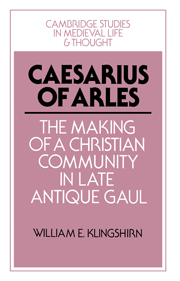Book contents
- Frontmatter
- Contents
- List of maps
- Acknowledgments
- List of abbreviations
- Concordance of Caesarius's Letters
- Map 1 The diocese of Aries and environs (c. 500)
- Map 2 The city and suburbs of Aries (c. 530)
- Introduction
- 1 In search of the vita perfecta
- 2 Late Roman Aries
- 3 The making of a reformer
- 4 Visigothic Arles and its bishop
- 5 The Ostrogothic peace
- 6 Christian rhetoric and ritual action
- 7 Christianity as a community religion
- 8 The limits of christianization
- 9 The coming of the Franks
- 10 The legacy of Caesarius
- Select bibliography
- Index
- Cambridge Studies in Medieval Life and Thought Fourth series
4 - Visigothic Arles and its bishop
Published online by Cambridge University Press: 02 December 2009
- Frontmatter
- Contents
- List of maps
- Acknowledgments
- List of abbreviations
- Concordance of Caesarius's Letters
- Map 1 The diocese of Aries and environs (c. 500)
- Map 2 The city and suburbs of Aries (c. 530)
- Introduction
- 1 In search of the vita perfecta
- 2 Late Roman Aries
- 3 The making of a reformer
- 4 Visigothic Arles and its bishop
- 5 The Ostrogothic peace
- 6 Christian rhetoric and ritual action
- 7 Christianity as a community religion
- 8 The limits of christianization
- 9 The coming of the Franks
- 10 The legacy of Caesarius
- Select bibliography
- Index
- Cambridge Studies in Medieval Life and Thought Fourth series
Summary
ASCETIC, PATRON, AND PASTOR
Late antique bishops who came to power in the face of local opposition often had to spend the early years of their episcopacy trying to restore harmony and consensus to their faction-ridden cities. When Honoratus of Lérins became bishop of Arles, according to his biographer, “his first concern was harmony and his chief task was to knit together again into one brotherhood of mutual affection those who had been separated, by passions still at white heat, over the choice of a bishop.” In such circumstances, bishops often found it helpful to devote more than ordinary attention to playing the part of the “good bishop.” They did so by leading conspicuously holy lives, providing for the well-being of their congregations, protecting their cities, and fulfilling the many other expectations generated by public opinion and late Roman traditions of patronage and public service. So, as soon as he was consecrated, Honoratus brought an ascetic “discipline” to the church and began to spend its funds on the needy. Likewise, immediately after a contested election, Avitus of Clermont (571–c.594) “showed his greatness in every respect, offering justice to the people, alms to the poor, relief to widows, and all possible assistance to orphans.”
Caesarius's earliest initiatives in office can in part be interpreted in the light of these examples. He first acted to reassure, his congregation that despite his election as bishop, he remained a monk and an ascetic at heart. He continued to live the austere life of a monk by eating simply(vita 1.37), shunning comfortable clothing (vita 11.42), and devoting himself to prayer and spiritual reading (vita 1.15).
- Type
- Chapter
- Information
- Caesarius of ArlesThe Making of a Christian Community in Late Antique Gaul, pp. 88 - 110Publisher: Cambridge University PressPrint publication year: 1993



